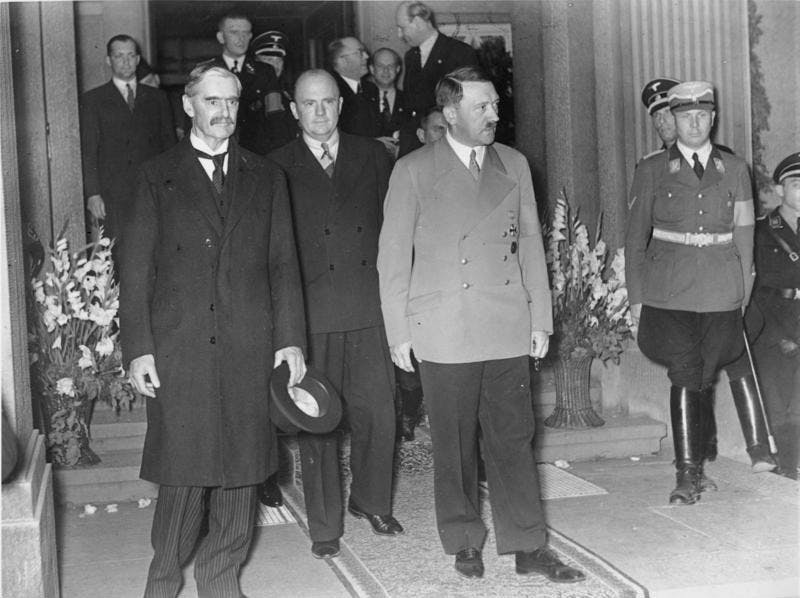 |
1938: UK PM Neville Chamberlain meets Adolf Hitler to
negotiate the Munich Agreement (photo: FindMyPast) |
The Munich Agreement was a pact signed on September 30, 1938, by Germany, the United Kingdom, France, and Italy, aimed at resolving the crisis over Germany's demand for the Sudetenland, a region of Czechoslovakia with a significant ethnic German population. British Prime Minister Neville Chamberlain also led the Conservative Party during this critical period.
Ultimately failing to avert war, the D-Day invasion of France, which, marking
the start of the Allied invasion of Nazi-occupied Western Europe, landed on June 6, 1944 - 5 years and 8 months later.
On the 81st anniversary of D-Day, we honor the valor of those who stormed the beaches of Normandy, confronting the consequences of delayed action against tyranny. Their sacrifice underscores a timeless lesson: appeasement can embolden aggressors, making eventual confrontation more costly.
Today, this lesson resonates as Israel faces threats from Hamas and Iran, and the United States navigates complex diplomatic engagements under President Donald Trump's administration.
Here’s a breakdown:
Background
Context: In the 1930s, Adolf Hitler, leader of Nazi Germany, pursued an aggressive expansionist policy, claiming to unite ethnic Germans into a greater German state.
Sudetenland: This border region of Czechoslovakia had a large German-speaking population. Hitler demanded its annexation, citing alleged mistreatment of Germans by the Czech government, and threatened war.
Appeasement: Britain and France, wary of another devastating war after World War I, followed a policy of appeasement, hoping to satisfy Hitler’s demands and maintain peace.
Key Players
Adolf Hitler (Germany): Sought to annex the Sudetenland as part of his broader goal to expand German territory.
Neville Chamberlain (UK): British Prime Minister, eager to avoid war, championed negotiation.
Édouard Daladier (France): French Premier, aligned with Britain but skeptical of appeasement’s success.
Benito Mussolini (Italy): Acted as a mediator, proposing a compromise to de-escalate tensions.
Notably Absent: Czechoslovakia and the Soviet Union were excluded from the talks, despite Czechoslovakia being directly affected.
The Agreement
Date: Signed in the early hours of September 30, 1938, in Munich, Germany.
Terms:
Germany was allowed to annex the Sudetenland immediately.
The transfer began on October 1, 1938, and was to be completed by October 10, 1938.
An international commission would oversee further border adjustments and plebiscites if needed.
Britain and France agreed to this in exchange for Hitler’s promise to make no further territorial demands in Europe.
Outcome: Chamberlain returned to Britain, famously declaring “peace for our time,” believing the agreement had averted war. (video: History Bytes)
Consequences
Short-Term:
Germany occupied the Sudetenland, weakening Czechoslovakia’s defenses and economy.
Tensions briefly eased, with Chamberlain hailed as a peacemaker by some.
Long-Term:
Betrayal of Czechoslovakia: The Czechs, not consulted, lost key territory, industrial resources, and fortifications, leaving them vulnerable.
Emboldened Hitler: Seeing appeasement as weakness, Hitler occupied the rest of Czechoslovakia in March 1939, violating the agreement.
Path to War: The failure of appeasement led to skepticism of diplomacy with Hitler. When Germany invaded Poland on September 1, 1939, Britain and France declared war, marking the start of World War II.
Legacy: The Munich Agreement is now widely seen as a failed act of appeasement, a cautionary tale about conceding to aggressive demands.
The agreement delayed war but at the cost of Czechoslovakia’s sovereignty and regional stability.
It exposed the limits of appeasement, shaping future debates on how to confront authoritarian regimes.

Today in 2025, veterans and officials have attended memorial services in Normandy to commemorate the 81st anniversary of the D-Day landings. this report from Britain's ITV News.
A remembrance service was held at the British Normandy Memorial in Ver-sur-Mer, which was attended by the ever-dwindling number of surviving veterans in their late 90s and older, remembering the thousands who died that day.
Nazi Germany declared its surrender to the Allied nations 11-months after the D-Day invasion. Thirteen weeks later (on August 15, 1945), Japan would surrender to the Allies - commemorated as V-J ("Victory over Japan") Day.
Veteran pilots of the mighty 8th Air Force of World War II Allied resistance against Axis conquest
 |
D-Day B-24 airmen reunite in L.A. (l-r) Elmo Maiden,
Bill Baird, and Wilbur Richardson Fri 6 June 2014 |
gathered on the 70th anniversary of D-Day, accompanied by their families and friends commemorate the 70th Anniversary of D-Day on Friday, June 6, 2014at the 94th Aero Squadron in Van Nuys, California. Several veteran pilots, both of the European and Pacific theaters of operation, shared their experience and attitudes with us about defending liberty from imperialism. The veteran pilots retell their experiences and share perspective on confronting tyranny today.
Wilbur Richardson, a B-17 Ball-Turret Gunner, flew 30 missions in 79 days, and two of them on D-Day. During his 30th mission, the German Axis forces wounded the Air-Force gunner. A highly decorated WWII Combat veteran, he was awarded the Purple Heart and DFC / Distinguished Flying Cross just to list a couple.
We asked whether he thought the U.S., Canadian, and British countries' sacrifices to save The West from authoritarian tyranny (then Japanese and Nazi German) was worth its cost. He also shares his perception about applying our defenses nowadays to the threats from imperialist Communism and Islamism.










